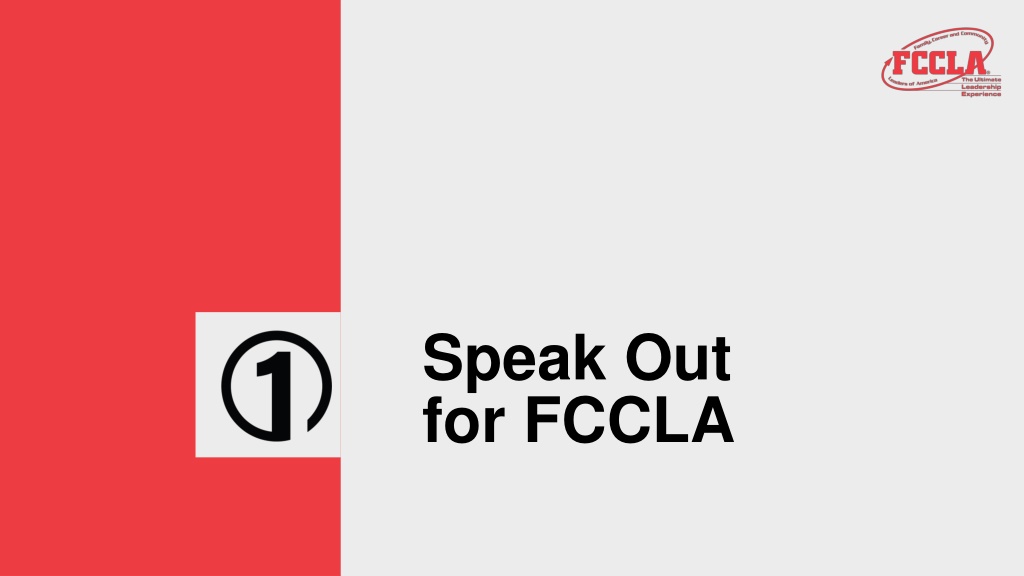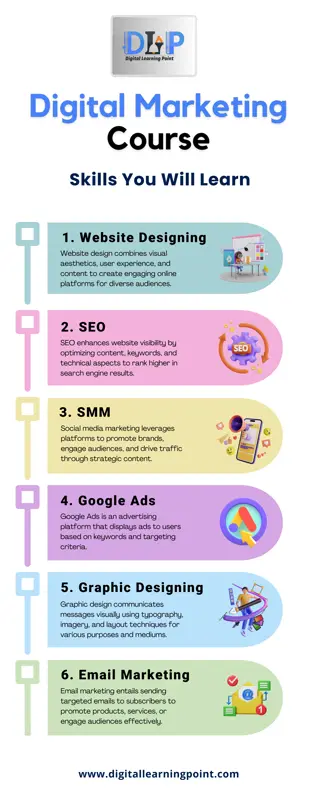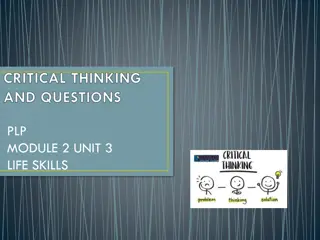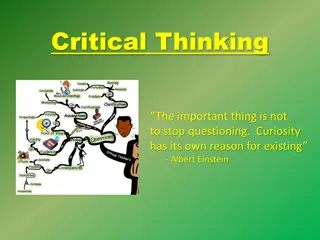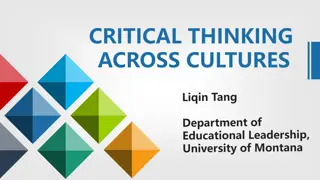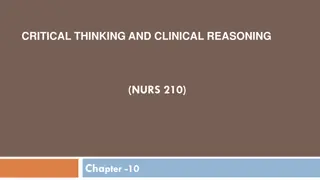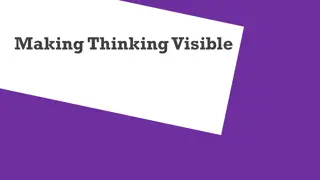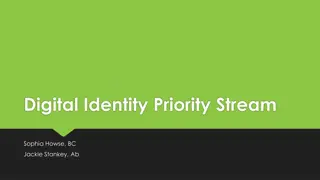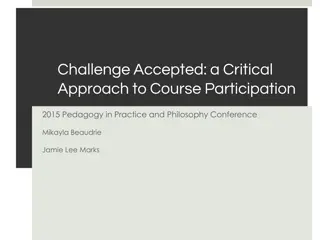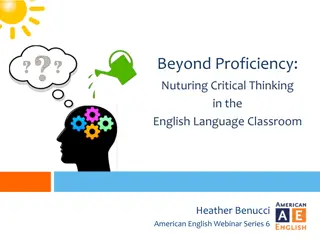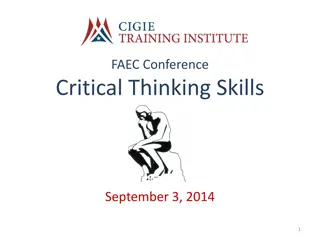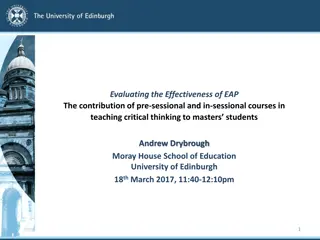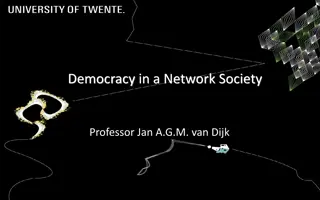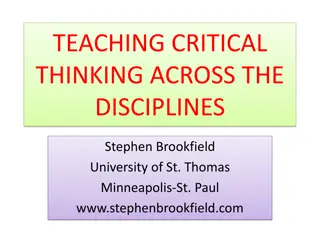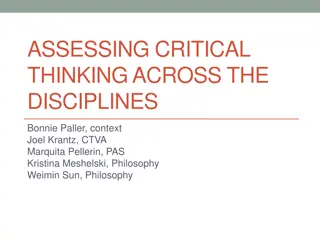Exploring Critical Thinking in a Digital Society
Delve into the realm of critical thinking in the modern era, where information is readily available. Discover how easy access to data impacts our ability to think critically. Explore the importance of critical thinking and its application in today's society. Learn about the six-step critical thinking process and its role in decision-making. Develop projects promoting critical thinking in organizations like FCCLA.
Download Presentation

Please find below an Image/Link to download the presentation.
The content on the website is provided AS IS for your information and personal use only. It may not be sold, licensed, or shared on other websites without obtaining consent from the author. Download presentation by click this link. If you encounter any issues during the download, it is possible that the publisher has removed the file from their server.
E N D
Presentation Transcript
Speak Out for FCCLA
Critical Thinking: Intellectually disciplined process of actively and skillfully conceptualizing, applying, analyzing, synthesizing, and/or evaluating information gathered from, or generated by, observation, experience, reflection, reasoning, or communication, as a guide to belief and action. Source National Council for Excellence in Critical Thinking
Think: What role does critical thinking play in our society today where information and answers are constantly accessible? Is it as important as it once was?
Think: How do these two things work together? Does our ability to easily access information help or hurt our critical thinking?
Think: In what context is critical thinking important and why?
Where Were Going: The member will be able to evaluate the importance and role of critical thinking in a 21st century society. The member will be able to describe and apply the critical thinking process. The member will be able to devise a project to promote FCCLA based on a SMART goal for the Speak Out for FCCLA Power of One unit.
How Well Get There: Critical thinking process Critical thinking in action Power of One: Speak Out for FCCLA
Navigating Critical Thinking: The Critical Thinking Process
The critical thinking process Six step process for thinking critically Can be used in any situation Promotes clear, unbiased, effective decision making Source https://www.designorate.com/steps-effective-critical-thinking/
Step One: Knowledge Identify the issue at hand Gain an understanding of the issue by asking questions Determine why you need to solve the problem
Step Two: Comprehension Gather information about your issue and possible solutions Seek data to expand your thinking
Step Three: Application Find the link between the information found and the resources available to solve the problem. Reflect to determine if your personal biases are impacting your information or thinking- remember, when thinking critically, it is important to remove your personal biases.
Step Four: Analyze Analyze the situation to determine the strong and weak points of the situation and obstacles to overcome. Prioritize issues at hand to solve.
Step Five: Synthesis Now that the situation has been analyzed, a decision should be formed. Decide how to best carry out your solution based on your priorities. If multiple solutions are present, determine the best option.
Step Six: Take Action Carry out your action plan based on your gathered information, priorities, and unbiased decision.
The Critical Thinking Process and the FCCLA Planning Process
The Critical Thinking Process and the FCCLA Planning Process The critical thinking process and the FCCLA Planning Process can work hand in hand Apply the critical thinking process when working to set a goal and form a plan
Critical Thinking in Action Activity
Discuss: What obstacles did your group run into with this activity?
Discuss: How did you exercise your critical thinking skills? Describe your process for accomplishing this task.
Power of One: Speak Out for FCCLA
Speak Out for FCCLA Speak Out for FCCLA is the fifth unit in the FCCLA Power of One national program. This unit focuses on informing others of FCCLA and its benefits for members. Remember, personal testimony is powerful. How can you show what FCCLA has done for you?
Think: What is the most impactful or interesting aspect of FCCLA to you? What have you benefited from the most?
Think: How do other groups, organizations, and teams best catch your attention and the attention of your peers?
Use these experiences to drive your project.
In Summary Critical thinking is a necessary skill for life now and in the future. The critical thinking process is a useful tool that can be used with the FCCLA Planning Process. Speak Out for FCCLA is the fifth unit of Power of One and focuses on telling others of the organization and its impact.
Which topics interest you? Creating promotional materials about FCCLA Demonstrating a STAR Event for potential members or a community group Explaining FCCLA to adult audiences Leading a school assembly sponsored by the FCCLA chapter Explaining Family and Consumer Sciences classes and FCCLA to potential future members Organizing National FCCLA Week activities Explaining FCCLA to administrators, counselors, and school board members Promoting FCCLA digitally Publicizing a chapter project Explaining FCCLA to local and state government officials Writing media releases or media advisories and contacting the media Requesting donations from businesses and community organizations Appearing on television or radio
What goal do you want to achieve within a topic? Create a poster, bulletin board, or display about an FCCLA program or chapter activity Research and find the names and contact information of the media representatives in your local media outlets and create a directory of these contacts for future chapter use Tell my parents and family members about FCCLA Demonstrate a STAR Event in class Publicize a chapter project in the school Help plan National FCCLA Week activities Make posters publicizing National FCCLA Week activities Read an announcement about an FCCLA activity on the school TV or audio system Write a media release about a chapter activity Write a letter to a state legislator about why FCCLA is important to schools, families, careers, and communities Write a press advisory to inform the local media of an upcoming chapter project or your chapter s National FCCLA Week activities Create a digital presentation about FCCLA
What goal do you want to achieve within a topic? Set up a booth for eighth grade or freshman orientation and hand out materials promoting FCCLA involvement Speak to school administrators, counselors, and/or school board members about FCCLA and chapter activities Create a chapter website or newsletter Speak to local and state government officials about FCCLA Serve as a committee chair to organize National FCCLA Week activities Participate in Capitol Leadership to learn how to effectively advocate for Family and Consumer Sciences and FCCLA Appear on a television or radio show to speak about FCCLA and chapter activities Creating a social media campaign or promotional video about FCCLA Send an article to the local paper about your chapter s activities and accomplishments Participate in Go for the Red Write an article or editorial about the benefits of FCCLA or how it has changed your life for the better and submit it to local media outlets Request donations from businesses and community organizations Other
Using the FCCLA Planning Process, begin to plan your project for Speak Out for FCCLA. Set a SMART goal to achieve.
